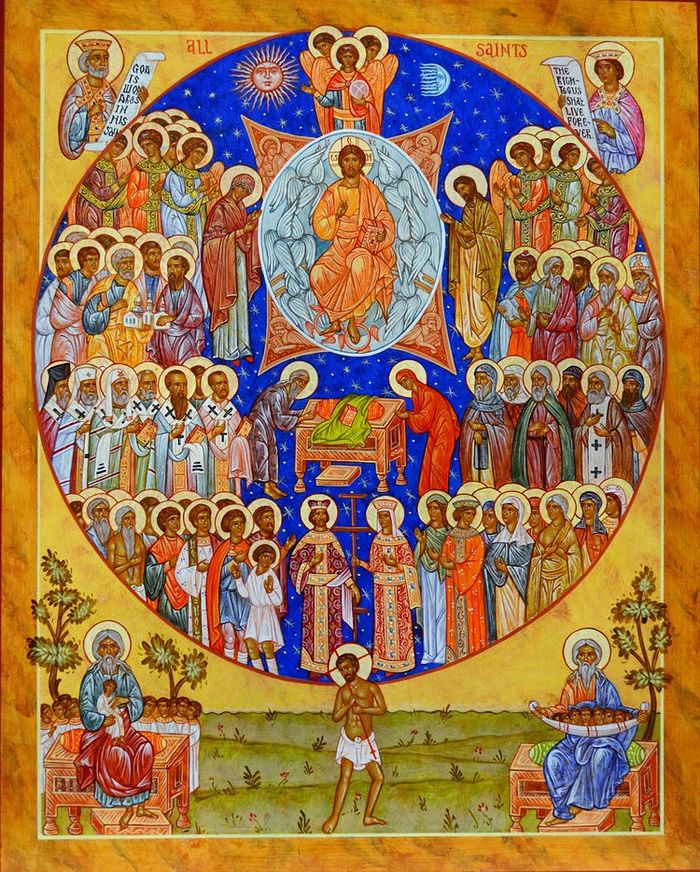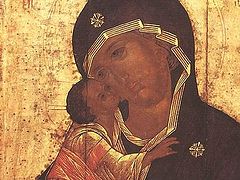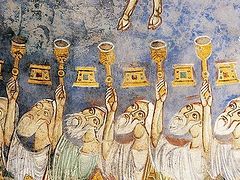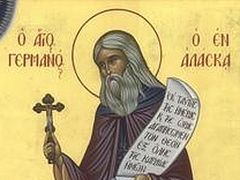Source: Get Religion
September 8, 2016
The other day I received a note from a GetReligion reader who clearly knows some theology.
The email concerned a passage in a National Public Radio story about St. Teresa of Kolkata that our reader knew, since I am an Eastern Orthodox layman, would punch my buttons. The reader was right. There is a good chance that NPR producers know little or nothing about Orthodox Christianity. Hold that thought.
The key to this case study is a very, very fine point of theology that is going to be hard to explain. It's possible that the story may have just barely missed the mark. However, it's more likely that it contains a spew-your-caffeinated beverage error that needs to be corrected.
Let's carefully tip-toe into this minefield. The passage in question focuses on the miracles, documented by church officials, that led to the canonization of the famous Albanian nun known as Mother Teresa of Calcutta.
A key quote comes from Bishop Robert Barron, the auxiliary bishop of the Catholic Archdiocese of Los Angeles. Read carefully and, well, pay attention to details about theology and church history:
Humanitarian work alone, however, is not sufficient for canonization in the Catholic Church. Normally, a candidate must be associated with at least two miracles. The idea is that a person worthy of sainthood must demonstrably be in heaven, actually interceding with God on behalf of those in need of healing.
Let me pause and note the presence of the word "interceding."
In Mother Teresa's case, a woman in India whose stomach tumor disappeared and a man in Brazil with brain abscesses who awoke from a coma both credited their dramatic recovery to prayers offered to the nun after her death in 1997.
"A saint is someone who has lived a life of great virtue, whom we look to and admire," says Bishop Barron, a frequent commentator on Catholicism and spirituality. "But if that's all we emphasize, we flatten out sanctity. The saint is also someone who's now in heaven, living in this fullness of life with God. And the miracle, to put it bluntly, is the proof of it."
No other Christian denomination posits this notion of an individual in heaven mediating between God and humanity.
In this case, note the use of the word "mediating." Notice that, in this context, the implication is that St. Teresa is the person doing the mediating.
However, the very upset reader who wrote me focused on that final sentence in the passage, the one stating that no "other Christian denomination" believes that saints in heaven – led by St. Mary, the mother of Jesus and the queen of heaven – join believers in their prayers to the Holy Trinity.
Say what? The reader notes:
Why do reporters forget/ignore/have no knowledge about the Orthodox (Eastern and Oriental) Churches? It seems that for journalists and many Protestants, the Orthodox church represents a "blind spot" in their view of religion and theology.
Yes, that statement in the NPR story would certainly come as a stunning surprise to the world's 250-300 million believers in the ancient churches of Eastern Orthodoxy. That's the planet's second largest Christian church (in this case it was wrong for NPR to use the word "denomination"), unless one attempted (perhaps risking war) to put the legions of different brands of Protestantism into one flock. There are 1.1 billion or so Catholics.
The Orthodox don't seek the intercessions of the saints?
When you walk into any Orthodox sanctuary you are surrounded by sacred art of the saints – icons, or "windows into heaven." Orthodox worship is full of prayers to God, to Jesus and to the Holy Spirit, as well as prayers asking St. Mary the Theotokos (the "God-bearer") and the saints to join with the worshipers in appeals for God's mercy and healing.
For newcomers, this fusion of art and prayer with the saints is usually the most striking element of Orthodox worship. Take a look at that Orthodox icon at the top of this post, showing the saints in heaven gathered around Christ the King. As my dear friend Frederica Mathewes-Green – the wife of our family's priest in Maryland for a dozen years – likes to say, when these saints join us in prayer, they are making a local call on our behalf.
It certainly appears that the NPR team needs to correct this piece, pronto. It's never wise to tick off Russians, Greeks, Arabs, etc.
However, let me mention one complication. Note that this report seems to assume that "interceding" is the same thing, when talking theological details, as "mediating."
For some, that second term – especially when used to describe the role of St. Mary – means far more than offering prayers on behalf of believers, but of playing a much more direct role in the "mediating" of healing and salvation. The key word here is "Mediatrix." Click here if you want to wade into that thicket.
I sincerely doubt that the NPR team was trying to go there, making a very fine point about the beliefs of Catholics. Like I said, the word "mediating" in this context appears to have been connected to St. Teresa, instead of St. Mary.
Here is the crucial concept to grasp, as a veteran Catholic priest once explained it to me:
"What must be stressed is that we pray for a saint to intercede for us with God. Actually, it's more accurate to say that we ask the saint to pray 'with' us, rather than to say that we pray 'to' a saint. ... You see, all grace comes from the Trinity, from the Godhead. These kinds of supernatural interventions always come from God. The saint plays a role, but God performs the miracle. That may sound like a trivial distinction to some people, but it is not."
When describing this process to non-Catholics, especially to Protestants who are critical of the church, the priest offers a metaphor from – believe it or not – local government.
There is this citizen, he explained, who has a problem. His sidewalk is so messed up that it has become dangerous. This citizen can, of course, call city hall and seek help. It would also be appropriate to directly call the mayor. However, this particular citizen also has a good friend, or perhaps it is even a loved one, who works in the mayor's office. Why not ask for this close friend to intercede, as well?
"That is what intercessory prayer is about. ..."
Orthodox Christians would say "Amen" to that.
So let's assume that this journalistic problem needs a simple solution.
Dear NPR folks: Please print a correction noting that Eastern Orthodox Christianity exists and that believers in this massive global flock constantly, and urgently, appeal for the saints in heaven to intercede for us, joining in our prayers for God's mercy and miracles.





Also, when people pray for healing, it might be said that the greatest healing is the death which allows us to commune with God.